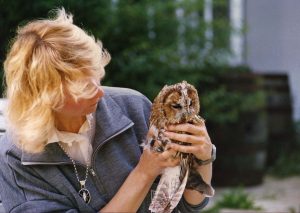Foundation funds Wildlife into the Wild Project
 We are very proud to announce the Pollyanna Pickering Foundation’s latest major Project. £6000.00 raised at the winter exhibition in Pollyanna’s private gallery will be used to fund a ground breaking publication of Best Practice Guidelines for the Rehabilitation and Release of Captive Wild Animals into the wild to benefit individual animal welfare
We are very proud to announce the Pollyanna Pickering Foundation’s latest major Project. £6000.00 raised at the winter exhibition in Pollyanna’s private gallery will be used to fund a ground breaking publication of Best Practice Guidelines for the Rehabilitation and Release of Captive Wild Animals into the wild to benefit individual animal welfare
Pollyanna’s first hand’s on work for animal welfare involved caring for hundreds of patients over the fifteen years she ran her own wildlife sanctuary from her home in Derbyshire. She treated injured wildlife, like the tawny owl (above) brought in with a broken wing, and raised countless orphans with dedicated feeding and care. Pollyanna passionately believed that wildlife belonged in the wild, and the vast majority of the birds and animals she cared for were subsequently released back into their natural habitats. Over the years she visited numerous wildlife rescue centres around the world, helping to care for orphaned wolf cubs, bottle feeding tiger cubs and many other animals. However she came to realise that many of the creatures being cared for in wildlife sanctuaries internationally were previously captive wild animals, rescued from the food or pet trade – like our own Pollyanna cheetah – or from appalling conditions in zoos or circuses. Pollyanna always believed that returning captive wild animals to the wild was morally the right thing to do. Unfortunately In some cases, release to the wild may not be in an animal’s best interests, especially if the animal has been irreversibly affected by captivity to the extent that their survival cannot be ensured. However, for many captive wild animals, if it is possible to proceed scientifically and thoughtfully, rehabilitation and release is possible providing the best outcome for the individual and helping to boost wild populations of endangered species.
However returning individual captive wild animals to the wild in a responsible manner is an incredibly complex process, requiring careful assessment and often long-term commitment and significant resources. The development and publication of these best practice guidelines, detailing the key steps that are required in this process, will therefore be highly beneficial to all organisations that rescue captive wild animals and aim to release them to the wild. We will collect and analyse information and case histories from numerous sanctuaries, so that all rehabilitators can benefit from learning the best ways to proceed with safely and effectively preparing an animal for living a truly wild life.
Work has already begun on the first stage, a broad overview document covering the steps that need to be taken when considering and undertaking the release of any captive wild animal, including assessment of the suitability of the individual animal, and the resources required for successful rehabilitation. Once this is complete, we will go on to develop detailed best practice guidelines for specific groups of animals including primates and big cats. In collaboration with The Born Free Foundation we are in the process of selecting a consultant to co-ordinate, draft and prepare the guidelines for publication. The consultant will undertake the work as a collaborative project, seeking input from Born Free UK staff, Born Free sanctuary managers in South Africa, Ethiopia and India, Born Free USA, and other organisations who have extensive experience in the rehabilitation and release of captive wild animals including the Zambia Primate Project the Sangha Pangolin Project, the National Wildlife Rehabilitators Association and the International Fund for Animal Welfare.
This ambitious and comprehensive project resonates strongly with the work carried out by Pollyanna during her lifetime and will help individual animals and endangered species globally into the future. . .